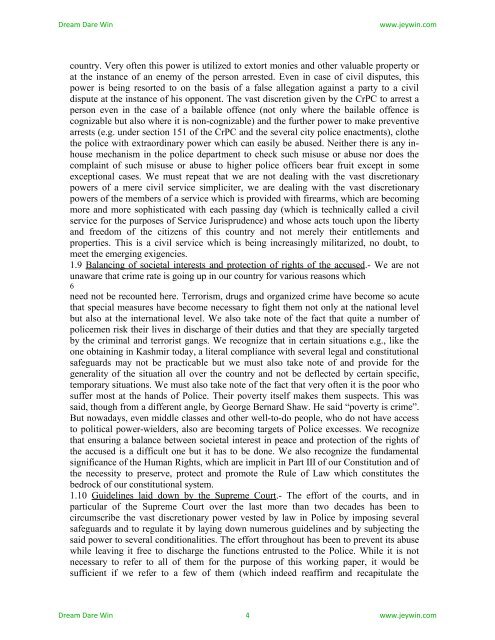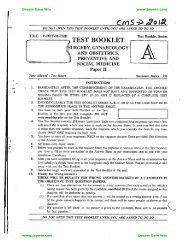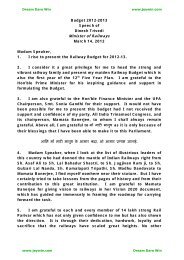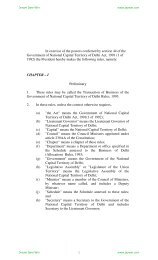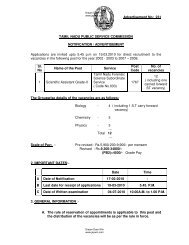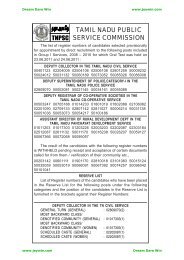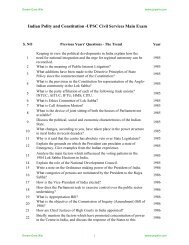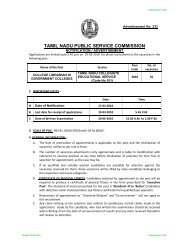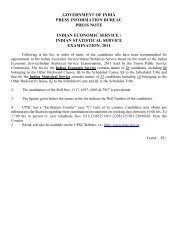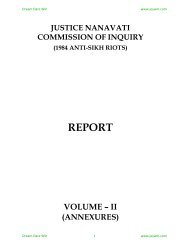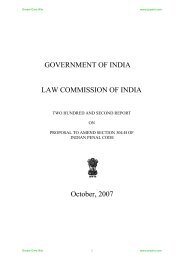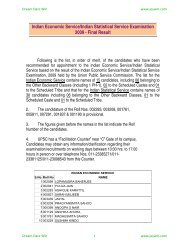Report 177 Part II â Law relating to Arrest - Jeywin
Report 177 Part II â Law relating to Arrest - Jeywin
Report 177 Part II â Law relating to Arrest - Jeywin
You also want an ePaper? Increase the reach of your titles
YUMPU automatically turns print PDFs into web optimized ePapers that Google loves.
country. Very often this power is utilized <strong>to</strong> ex<strong>to</strong>rt monies and other valuable property or<br />
at the instance of an enemy of the person arrested. Even in case of civil disputes, this<br />
power is being resorted <strong>to</strong> on the basis of a false allegation against a party <strong>to</strong> a civil<br />
dispute at the instance of his opponent. The vast discretion given by the CrPC <strong>to</strong> arrest a<br />
person even in the case of a bailable offence (not only where the bailable offence is<br />
cognizable but also where it is non-cognizable) and the further power <strong>to</strong> make preventive<br />
arrests (e.g. under section 151 of the CrPC and the several city police enactments), clothe<br />
the police with extraordinary power which can easily be abused. Neither there is any inhouse<br />
mechanism in the police department <strong>to</strong> check such misuse or abuse nor does the<br />
complaint of such misuse or abuse <strong>to</strong> higher police officers bear fruit except in some<br />
exceptional cases. We must repeat that we are not dealing with the vast discretionary<br />
powers of a mere civil service simpliciter, we are dealing with the vast discretionary<br />
powers of the members of a service which is provided with firearms, which are becoming<br />
more and more sophisticated with each passing day (which is technically called a civil<br />
service for the purposes of Service Jurisprudence) and whose acts <strong>to</strong>uch upon the liberty<br />
and freedom of the citizens of this country and not merely their entitlements and<br />
properties. This is a civil service which is being increasingly militarized, no doubt, <strong>to</strong><br />
meet the emerging exigencies.<br />
1.9 Balancing of societal interests and protection of rights of the accused.- We are not<br />
unaware that crime rate is going up in our country for various reasons which<br />
6<br />
need not be recounted here. Terrorism, drugs and organized crime have become so acute<br />
that special measures have become necessary <strong>to</strong> fight them not only at the national level<br />
but also at the international level. We also take note of the fact that quite a number of<br />
policemen risk their lives in discharge of their duties and that they are specially targeted<br />
by the criminal and terrorist gangs. We recognize that in certain situations e.g., like the<br />
one obtaining in Kashmir <strong>to</strong>day, a literal compliance with several legal and constitutional<br />
safeguards may not be practicable but we must also take note of and provide for the<br />
generality of the situation all over the country and not be deflected by certain specific,<br />
temporary situations. We must also take note of the fact that very often it is the poor who<br />
suffer most at the hands of Police. Their poverty itself makes them suspects. This was<br />
said, though from a different angle, by George Bernard Shaw. He said “poverty is crime”.<br />
But nowadays, even middle classes and other well-<strong>to</strong>-do people, who do not have access<br />
<strong>to</strong> political power-wielders, also are becoming targets of Police excesses. We recognize<br />
that ensuring a balance between societal interest in peace and protection of the rights of<br />
the accused is a difficult one but it has <strong>to</strong> be done. We also recognize the fundamental<br />
significance of the Human Rights, which are implicit in <strong>Part</strong> <strong>II</strong>I of our Constitution and of<br />
the necessity <strong>to</strong> preserve, protect and promote the Rule of <strong>Law</strong> which constitutes the<br />
bedrock of our constitutional system.<br />
1.10 Guidelines laid down by the Supreme Court.- The effort of the courts, and in<br />
particular of the Supreme Court over the last more than two decades has been <strong>to</strong><br />
circumscribe the vast discretionary power vested by law in Police by imposing several<br />
safeguards and <strong>to</strong> regulate it by laying down numerous guidelines and by subjecting the<br />
said power <strong>to</strong> several conditionalities. The effort throughout has been <strong>to</strong> prevent its abuse<br />
while leaving it free <strong>to</strong> discharge the functions entrusted <strong>to</strong> the Police. While it is not<br />
necessary <strong>to</strong> refer <strong>to</strong> all of them for the purpose of this working paper, it would be<br />
sufficient if we refer <strong>to</strong> a few of them (which indeed reaffirm and recapitulate the


